
EGU General Assembly 2021, virtual again
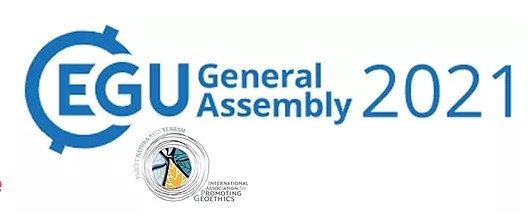 This year's General Assembly of the European Geosciences Union (EGU) from 19 to 30 April 2021 takes again place in the virtual EGU Sphere. Fired up by broad debates in almost all countries about how to start on new, more sustainable footings post-covid there was a notable increase in submissions seeking a stronger explicit connection between asking questions in society and doing research and education in the geosciences.
This year's General Assembly of the European Geosciences Union (EGU) from 19 to 30 April 2021 takes again place in the virtual EGU Sphere. Fired up by broad debates in almost all countries about how to start on new, more sustainable footings post-covid there was a notable increase in submissions seeking a stronger explicit connection between asking questions in society and doing research and education in the geosciences.
Curbing Maritime Insecurity in the Niger Delta - SWAIMS Webinar
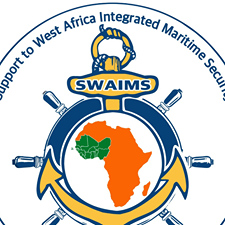 SWAIMS, the Regional Programme "Support to West Africa Integrated Maritime Security", headquartered in Abidjan, Côte d'Ivoire, focused it's webinar on 31 March 2021 on "Curbing Maritime Insecurity in the Niger Delta". One of the speakers invited in the occasion of this exchange with civil society organisations was Prof. Stella Williams, Vice President of Mundus maris, who spoke on the topic of Illegal, unreported and unregulated (IUU) fishing and its effect on small-scale fisheries.
SWAIMS, the Regional Programme "Support to West Africa Integrated Maritime Security", headquartered in Abidjan, Côte d'Ivoire, focused it's webinar on 31 March 2021 on "Curbing Maritime Insecurity in the Niger Delta". One of the speakers invited in the occasion of this exchange with civil society organisations was Prof. Stella Williams, Vice President of Mundus maris, who spoke on the topic of Illegal, unreported and unregulated (IUU) fishing and its effect on small-scale fisheries.
Coexistence of legal and illegal supply chains - V2V thematic webinar – March 2021
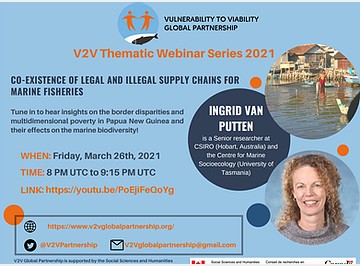 In the third of the monthly thematic webinars of the V2V research partnership about exploring ways to lead small-scale fisheries from vulnerability to viability, on 27 March 2021, Ingrid van Putten of CSIRO in Australia shared research results into the marketing of four major marine commodities from the so-called Treaty villages in Papua New Guinea. Lack of information, skills and support systems for communities in the coastal villages of Torres Strait mean that swimbladders of Barramundi and Jewfish considered a delicacy and an aphrodisiac in countries like China, dried bêche de mer and shark fins produced by men and live mud crabs caught by women fetch low prices, especially when sold illegally to Indonesian traders conveniently going from house to house to buy the catch.
In the third of the monthly thematic webinars of the V2V research partnership about exploring ways to lead small-scale fisheries from vulnerability to viability, on 27 March 2021, Ingrid van Putten of CSIRO in Australia shared research results into the marketing of four major marine commodities from the so-called Treaty villages in Papua New Guinea. Lack of information, skills and support systems for communities in the coastal villages of Torres Strait mean that swimbladders of Barramundi and Jewfish considered a delicacy and an aphrodisiac in countries like China, dried bêche de mer and shark fins produced by men and live mud crabs caught by women fetch low prices, especially when sold illegally to Indonesian traders conveniently going from house to house to buy the catch.
Catching-up - SSF Academy Yoff, 27 Febr. 2021
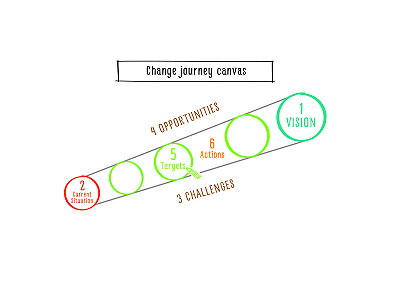 After more than one year without presential trainings of the Small-Scale Fisheries Academy due to the covid-19 pandemic a catching-up workshop was convened with some precautionary measures in Yoff, Saturday, 27 February 2021. This not only helped to reconnect and exchange about what had happened in the meantime with the annual workplans of Academy learners, but it was also an opportunity to try the feasibility of a mixed working method with co-facilitation on the spot and remotely.
After more than one year without presential trainings of the Small-Scale Fisheries Academy due to the covid-19 pandemic a catching-up workshop was convened with some precautionary measures in Yoff, Saturday, 27 February 2021. This not only helped to reconnect and exchange about what had happened in the meantime with the annual workplans of Academy learners, but it was also an opportunity to try the feasibility of a mixed working method with co-facilitation on the spot and remotely.
Happy International Women's Day, 8 March 2021
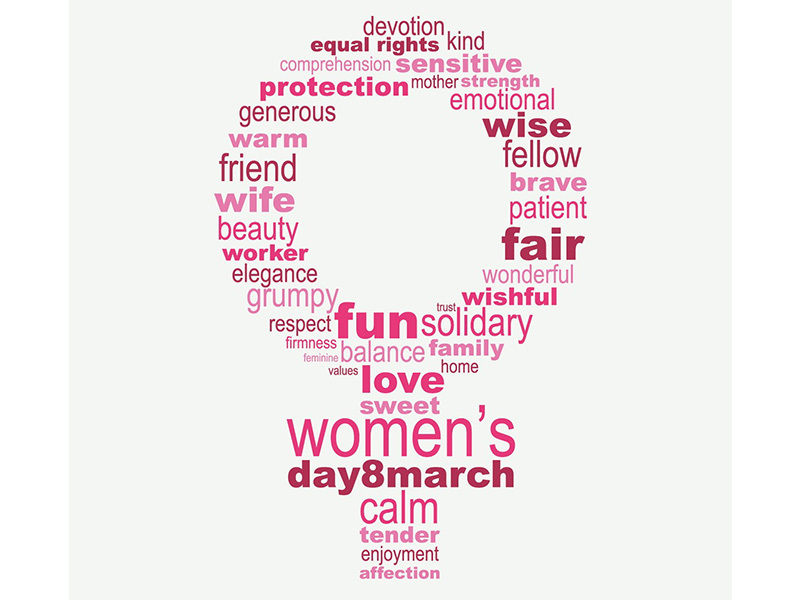 Today, we want to honour at least a small selection of the women leaders in fisheries working to make the world a better place.
Today, we want to honour at least a small selection of the women leaders in fisheries working to make the world a better place.
Aujourd'hui, nous voulons rendre hommage à au moins une petite sélection de femmes leaders de la pêche qui travaillent pour rendre le monde meilleur.
Heute möchten wir zumindest eine kleine Auswahl der leitenden Frauen in der Fischerei ehren, die daran arbeiten, die Welt zu einem besseren Ort zu machen.
Hoy, queremos honrar al menos a una pequeña selección de las mujeres líderes en la pesca que trabajan para hacer del mundo un lugar mejor.
Oggi vogliamo onorare almeno una piccola selezione delle donne leader nel settore della pesca che lavorano per rendere il mondo un posto migliore.
Vibrant and vital small-scale fisheries - V2V thematic webinar - Febr. 2021
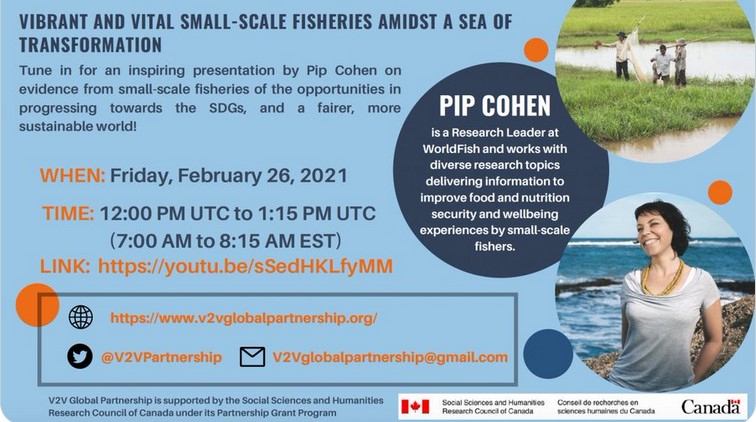 In the second of the monthly thematic webinars organised by the V2V research partnership about exploring ways for small-scale fisheries from vulnerability to viability Research Lead Pip Cohen of WorldFish Center talked about vibrant and vital small-scale fisheries amidst a sea of transformation. While the major global and regional political fora endorse and recommend small-scale fisheries as reflected e.g. in the Sustainable Development Goals (SDGs) of Agenda 2030, the Voluntary Guidelines for securing sustainable SSF, statements by the International Labour Organization (ILO), the ground realities are more complicated.
In the second of the monthly thematic webinars organised by the V2V research partnership about exploring ways for small-scale fisheries from vulnerability to viability Research Lead Pip Cohen of WorldFish Center talked about vibrant and vital small-scale fisheries amidst a sea of transformation. While the major global and regional political fora endorse and recommend small-scale fisheries as reflected e.g. in the Sustainable Development Goals (SDGs) of Agenda 2030, the Voluntary Guidelines for securing sustainable SSF, statements by the International Labour Organization (ILO), the ground realities are more complicated.
Mundus maris Awards 2021: The Ocean: Life and Livelihoods
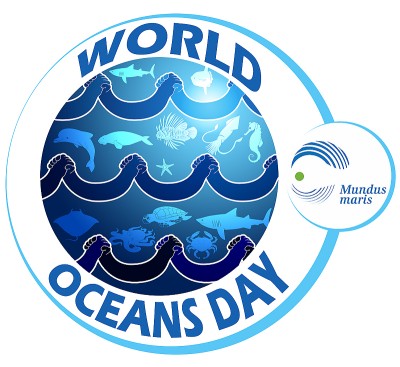 To celebrate the United Nations World Ocean Day: "The ocean: life and livelihoods" our international non profit association invites you to participate in the Mundus maris Awards 2021 (MMA 2021) on how to appreciate the ocean and how it is our lifesource, supporting humanity and every other organism on Earth. The year 2021 also marks the start of the UN Decade of the Ocean 2021-2030: Ocean Science for Sustainable Development.
To celebrate the United Nations World Ocean Day: "The ocean: life and livelihoods" our international non profit association invites you to participate in the Mundus maris Awards 2021 (MMA 2021) on how to appreciate the ocean and how it is our lifesource, supporting humanity and every other organism on Earth. The year 2021 also marks the start of the UN Decade of the Ocean 2021-2030: Ocean Science for Sustainable Development.
FAO webinar 'Small, low-cost fish: from bait to plate', 15-16/02/2021
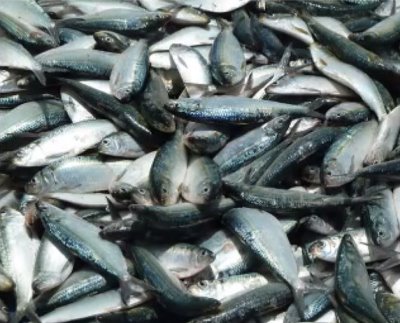 In collaboration with four research projects with a geographical focus on Ghana/Gulf of Guinea, East Africa, the Indian Subcontinent, Indonesia as well as Peru this two-day FAO web seminar served to share interesting research results about production, processing, marketing, consumption and governance aspects of the value chain of small, low-cost fish. The prime concern was how to ensure that people with little purchasing power could retain access to healthy fish food rich in micronutrients.
In collaboration with four research projects with a geographical focus on Ghana/Gulf of Guinea, East Africa, the Indian Subcontinent, Indonesia as well as Peru this two-day FAO web seminar served to share interesting research results about production, processing, marketing, consumption and governance aspects of the value chain of small, low-cost fish. The prime concern was how to ensure that people with little purchasing power could retain access to healthy fish food rich in micronutrients.
Impact of seafood trade - V2V thematic webinar Jan. 2021
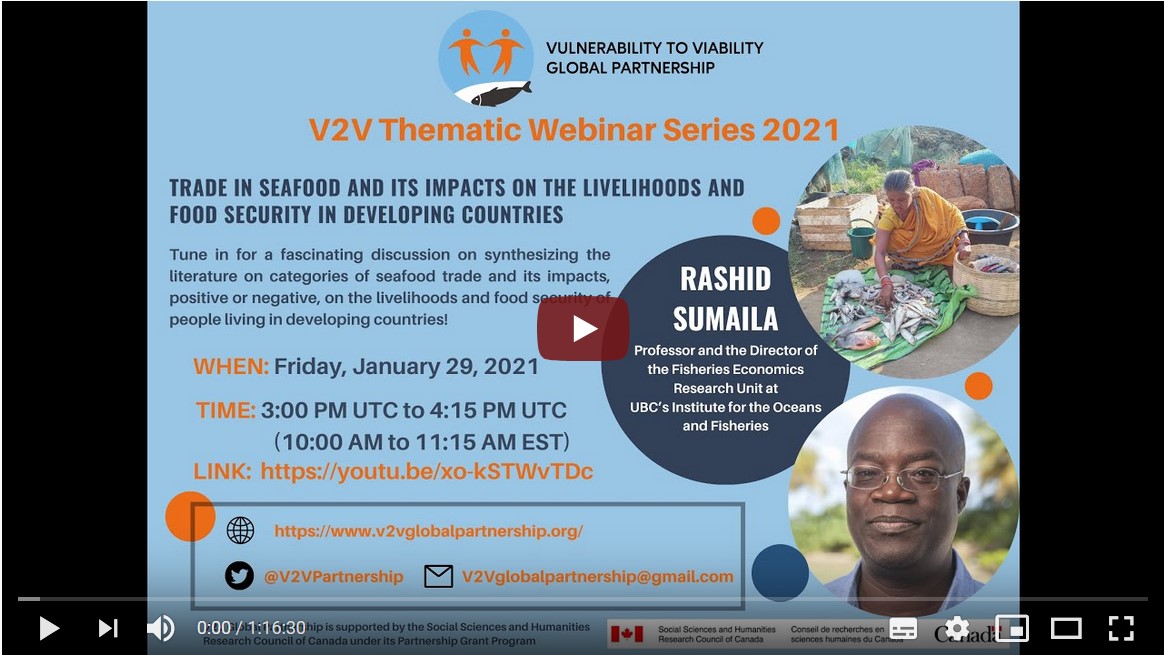 The large research collaboration about small-scale fisheries titled "From vulnerability to viability" (V2V) is transdisciplinary and composed of some 100 partners, one of which is Mundus maris asbl. Approved in 2020, in-depth work is starting on 12 case studies, six in Africa and six in Asia. Sharing of research results within and well beyond the partnership is one of its features. This is why a series of monthly thematic webinars was started in January 2021. The inaugural session featured Rashid Sumaila,
The large research collaboration about small-scale fisheries titled "From vulnerability to viability" (V2V) is transdisciplinary and composed of some 100 partners, one of which is Mundus maris asbl. Approved in 2020, in-depth work is starting on 12 case studies, six in Africa and six in Asia. Sharing of research results within and well beyond the partnership is one of its features. This is why a series of monthly thematic webinars was started in January 2021. The inaugural session featured Rashid Sumaila,
WTO: Phase out harmful fisheries subsidies!
 Phasing out harmful fisheries subsidies has been on the agenda of the World Trade Organization (WTO) since 20 years. Doing so at long last by 2020 is target 6 of Sustainable Development Goal (SDG) 14 "Life under Water" adopted by the UN General Assembly in 2015. It's urgent as harmful subsidies are currently estimated at about USD 20.5 per year (1) fuelling overfishing and all kinds of illicit practices and affecting other SDGs negatively.
Phasing out harmful fisheries subsidies has been on the agenda of the World Trade Organization (WTO) since 20 years. Doing so at long last by 2020 is target 6 of Sustainable Development Goal (SDG) 14 "Life under Water" adopted by the UN General Assembly in 2015. It's urgent as harmful subsidies are currently estimated at about USD 20.5 per year (1) fuelling overfishing and all kinds of illicit practices and affecting other SDGs negatively.
Concert for the Ocean, Louvain, 14 Nov. 2020
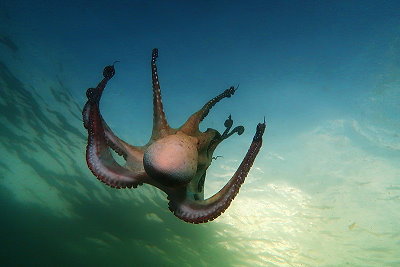 We are all connected to the ocean that provides us with every second breath we take, provides food, enjoyment, jobs, trade routes and more. To celebrate the Ocean and 10 years of Mundus maris the language of music invites us to navigate the seas and visit coastal cities, which welcome us with their melodies.
We are all connected to the ocean that provides us with every second breath we take, provides food, enjoyment, jobs, trade routes and more. To celebrate the Ocean and 10 years of Mundus maris the language of music invites us to navigate the seas and visit coastal cities, which welcome us with their melodies.






